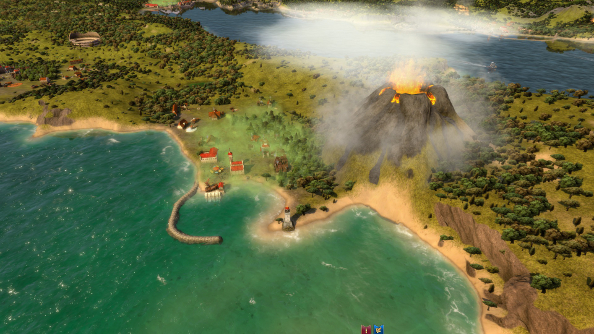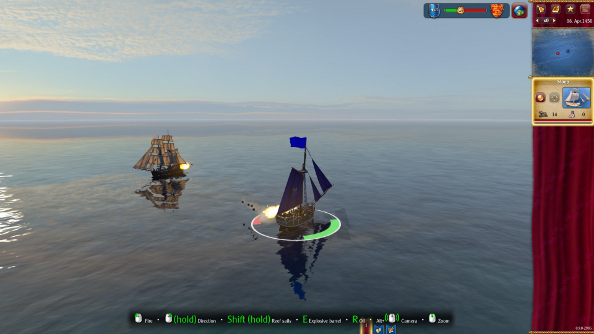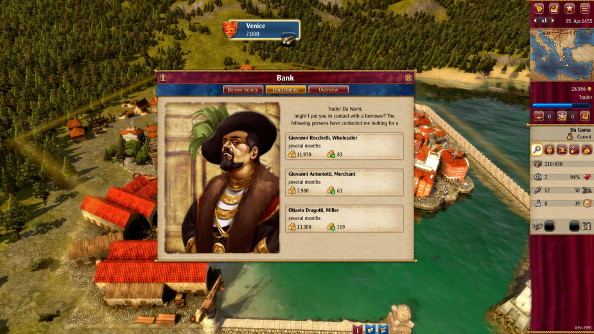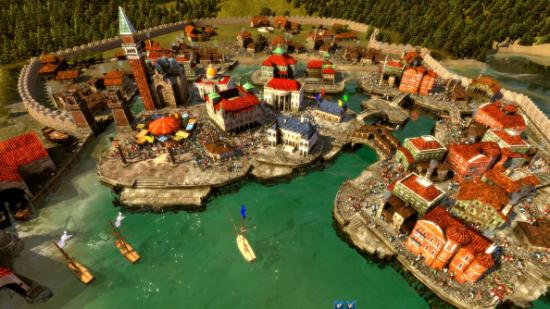Greed is good. Michael Douglas would have fit in well in Rise of Venice, a brightly coloured Renaissance trade simulator, where profit is, umm, Doge.
Given charge of a wee trading ship, I was consumed with a desire to sail all around the Mediterranean, sniffing out deals and accumulating a fortune. And I did exactly that. I also got completely lost, called a treasure map names that would make the ladies of that period faint and bought more fruit than humanity could possibly consume in a thousand years.
It’s a time of abundant wealth, fancy parties, political intrigue and shady pirates, Rise of Venice’s painted and overly long introduction informs me, which is the perfect setting for my brand spanking new trader and captain Jim Dudeman (of the esteemed Lombardian Dudemans) to make a name for himself.
And crikey is it easy to get started gathering all that lovely money. Economic and trade simulators revel in their complexity, but Rise of Venice has an elegantly simple trade system, setting players on the right path immediately. As I get richer and richer I start to actually imagine myself as Michael Douglas, even marrying Catherine Zeta Jones, but then I remember that they got divorced and I go back to focusing on my burgeoning trade fleet.

I build my fruit empire early. Ragusa wants fruit, and lots of it. I’m able to tell how much the city is clamouring for the healthy snack because right next to the city name was a picture of some fruit. Knowing exactly what fruit looks like, I rapidly send my convoy – made up of two trading vessels and an escort, for those pesky sea battles – down south, to a city where I’d recently purchased a trading license. They are fruit mad down there too, but they have more than they can handle. I’m about to make a juicy, citrusy, killing.
The trade menu only takes a second to figure out. All the goods are clearly listed, with the current price slapped onto a slider, and those goods which are available (dependent on one’s rank in an effort to ease new traders into the game) clearly marked. Moving the slider to the left sells good, to the right buys them, and as the slider moves the price changes in line with demand. Buying too many delicious apples and what not would raise the price as the commodity became rarer, while selling too many at once would lower the price as he good becomes more abundant.
I’m soon heralded as the fruit Doge, master of apples, lord of lemons. As my fleet expands, and becomes multiple convoys with automated routes, the trade game starts to be almost serene. It’s all very zen, buying low, selling high, cottoning on to demand, discovering new towns that manufactured the very item that five other cities were desperate for. I’m woken from my serenity by a 2×4 to the face. Otherwise known as the campaign and the plethora of dreary mini-games that take up time better spent enjoying the excellent trade and economic systems.
Rise of Venice’s campaign ostensibly exists to show players the ropes before they embark on the meaty sandbox mode, but it’s obtuse. I can’t even say that it explains trading very well, because it really doesn’t. It’s easy to understand because it’s well designed, not because instructions or explanations are anything less than muddy and uninformative.

The campaign pattern appears to be to teach players obvious things that anybody could have guessed without assistance, throw in a mission objective, offer a vague hint and then provide no more information.
Sometimes extra hints, hidden away the bottom of the screen behind a tab, pop up, noticable long after they are relevant, proving to be unhelpful anyway. One such tip informs me that escorts – used in combat – share sailors with the fleet, so I should keep an eye on their numbers. I do this, and notice that I have zero sailors, which of course makes no sense. The game doesn’t mention sailors again. I still don’t know how my fleet managed to function for so long with nobody onboard any of the ships, even after purchasing a bunch of them.
I can’t say I’m a fan of combat getting in the way of earning a buck, but Rise of Venice attempts to simulate naval battles in half-hearted real time aquatic scraps. The campaign encourages me to get into a fight with pirates early on, but with no pirates to be found, nor an explanation for how to initiate such a scenario, I just carry on my merry way.
Luckily, I discover that manually engaging in combat is pretty similar to auto-resolving, since the vessels just do their own thing unless told otherwise. Taking control involves changing their direction and fiddling around with cannons and making sure you’re positioned correctly for a broadside attack.

After drowning in fruit and gold, fending off pirates and travelling up and down the Mediterranean, I start to look for new get rich quick schemes, and find myself on the hunt for treasure! I even have a head start on my new venture, being given two pieces of a treasure map and the locations of five more.
As I look at my treasure-promising jigsaw, all the fun of treasure hunting fizzles away. Seven squares are before me, and all of them are sea tiles. No landmarks, no deformed edges revealing with way to fit them all together, just a bunch of blue squares, one of which has an “x” on it. Put the map together and find the treasure, my advisor tells me. What bloody map, I ask him pointlessly. I give up on my quest.
After that point, I start to get irritated every time I’m called on to do something, whether it be locating some items for some flavourless character or send a family member I have no connection to on an assignment to further our fortunes. I just want to get back to the excellent economic and trade system. I want to own all the fruit in the world, building warehouses and a manufacturing industry around it. I want to see small towns once rife with plague grow into trading ports because I deem it so, but my attention keeps being drawn away.
As the sight of fruit starts to turn my stomach, I stop building Jim Dudeman’s empire. I recall how Wall Street ended, with Gekko losing everything and being screwed over by his protege. I’m left with one conclusion: greed is not good. But it does leave you with a full fruit bowl.
Rise of Venice is released in the UK on Friday.
